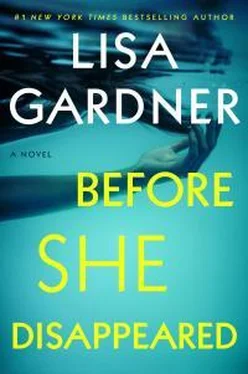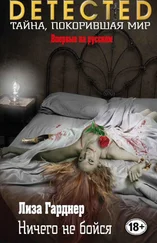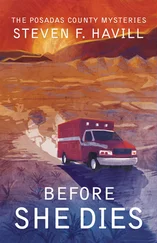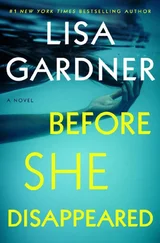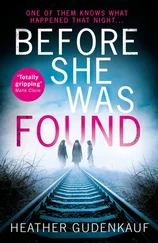“Deke tried to help,” she says, still looking down at her lap. I’m assuming she means her and Livia’s relationship. “The night, when Frédéric strangled Livia . . . He would’ve killed me next, but Deke stopped him. I was still useful, he argued. The student visas had been my idea, yes? He also convinced Frédéric to drive Livia’s body to Franklin Park. He said it would distract the police and be safer than having the cops discover her body near the rec center. But really, Deke couldn’t bear the thought of Livia being dumped in some alley. I couldn’t either.”
“I’m sorry.”
“Holden shot him in the van. Emmanuel saw. Deke . . . He wasn’t a good man, he made many mistakes, especially with his sister, but I’m sorry he’s dead.”
I’m not sure what to say. I’m getting tired, the ache in my shoulder deeper. Finally: “You’re a survivor, Angelique. You’re strong, resilient. Don’t forget that. If you hadn’t risked posting the essay, dropping the fake license, appearing in public, we wouldn’t have found you. We wouldn’t have been able to save you or your brother.”
It’s not gratitude I see reflected in her eyes, however, but guilt. She wasn’t trying to save herself. She’d been trying to save Livia. And her girlfriend’s death was now her burden to bear.
“It will get better,” I repeat, though I can already tell she doesn’t believe me. She’s not ready to forgive herself yet. Maybe she never will. I understand that, too.
Angelique stands up, gives me a final, solemn nod, then departs. I manage some water, more of what I’m assuming is Viv’s homemade soup. I brush my teeth, comb my hair, refresh my bandage. The bullet graze on my right arm is already significantly healed. Which leaves only the recently stitched hole in my shoulder. That will definitely leave a scar. I can picture myself fingering it at night, reminding myself that once, I was successful. Once, I got it right.
Do I feel like a different person yet?
I keep waiting, but no such luck. I remain Frankie Elkin. Alcoholic. Ex-lover. Lost soul.
I retreat to the mattress, taking with me my brown leather messenger bag. I pull out two manila files, pore through the contents till my eyes grow heavy. When I wake up again my room is dark and a shadow looms beside my bed.
“Shhh,” Lotham says as he climbs onto the mattress beside me. “Just rest.” Then he gathers me up against him, and I feel the heat of his body. I drift off to the steady rhythm of his breathing. Later, when I wake up crying, he wipes away my tears with his fingers and then with his lips and I turn myself fully against him. I move urgently and demandingly until he finally gives up and gives in. Then we are skin to skin, gentle but rough, soft but demanding, and it is better than any drop of booze.
Afterward, I finally sleep deep and hard and when I wake up to find him gone, that’s okay, too. It makes it easier for what I have to do next.
I pick up my phone and dial. First time I’ve ever called in daylight. I’m not even sure she’ll pick up. Then:
“Frankie, please—”
“I found a missing girl. Her name is Angelique Badeau. She’s sixteen. I brought her home alive.”
A pause. “That’s . . . that’s good. Paul would like that. But you don’t need me to tell you that, Frankie. And all these years later, please, can you just stop calling? It hurts.”
“He died saying he loved you. He said . . . So many he tried to fix. But you healed him. You were the great love of his life.”
A much longer pause now. Maybe she’s crying. I know I am. I’ve never told her this before. I should’ve. But I just couldn’t. I needed, selfishly, for Paul to be about me. I needed, terribly, to keep his last moments as mine.
“Thank you,” Amy says at last. I can hear her drawing a shuddery breath.
“I’ll stop calling. I’m sorry. I don’t know why . . .”
But I do, and she does, too. Because she is all I have left of him. Just like I am her sole connection to his memory.
“Well, maybe every now and then,” she allows.
“Are you happy?” I ask her, genuinely curious.
“I have a new husband, a baby girl. Life moves on, Frankie. But thank you for calling. Thank you for telling me that.”
“Good-bye, Amy.”
“Good-bye, Frankie.”
I set down the phone. I take a deep breath. And then I’m ready. Not new and improved, but maybe the old model is better than I thought. Final shower, fresh change of clothes, then I find Stoney downstairs in his office.
He doesn’t have to ask to know. “That’s it, then? Back on the road?”
I nod.
“You can keep the apartment till the end of the month. Longer, if you want to return to work.”
I nod.
“Bet there’s more cases around here. Maybe people will even come to you, as word gets out.” He studies me. I love the lines of his face, a man who’s known heartache but also hope.
“Thank you,” I tell him, and for both of us, it’s enough.
I return upstairs and pack. Five shirts, three pairs of pants, same threadbare underwear I still haven’t gotten around to replacing.
I pause long enough to write a note. Lotham will be angry, but he won’t be surprised.
He is who he is. And I am who I am.
My name is Frankie Elkin and finding missing people is what I do. When the police have given up, when the public no longer remembers, when the media has never bothered to care, I start looking.
Now, I take my suitcase. Head downstairs.
And then, I disappear.
AUTHOR’S NOTE AND ACKNOWLEDGMENTS
This entire novel started with an online article from BBC, regarding Lissa Yellowbird-Chase, an everyday person who also searches for missing persons. From that news brief, I discovered an entire world of amateurs who seek to make a difference by working missing persons cold cases. What I gleaned: Especially in situations where technology has failed, the right person asking the right questions can make all the difference. That total strangers care that much for the missing among us, I found powerful—though also heartbreaking. So this book is for the dedicated, whether they’re amateur detectives, professional pilots, registered dog handlers, et cetera, who give their time for another family’s closure. I am totally inspired by you.
In the nuts-and-bolts department, several others made a difference. First off, Mary Nèe-Loftus, who brought the world of Mattapan—not to mention the school system of Boston—to life. Thank you, also, Betsy Eliot, for introducing me to Mary.
Also, for my dear friend Margie Aitkenhead. When I said, hey, I need to walk the streets of a tough neighborhood in Boston, she never hesitated to say yes. Also, the locals went out of their way to assist our efforts—and the food was beyond amazing. I reference several Mattapan landmarks in this novel, from Le Foyer to Simco’s; you should visit and eat at both. Haitian meat pies are my new favorite food, and I can’t wait to eat more.
I’m also indebted to Superintendent-in-Chief Dan Linskey, Ret., Boston Police Department, who walked me through all the resources the BPD have at their disposal. Let me just say, disappearing a person in this day and age of traffic cams and LPR is extremely complicated. And I’m extremely impressed by all the resources a major city police force has to bring to bear.
I’m also indebted to my daughter, who—having eavesdropped on my conversation with Linskey—informed me that I asked all the wrong questions. She then proceeded to tell me all the resources available to any halfway intelligent teenager for shielding communications from nosy parents. As a mother, I wasn’t sure whether to be impressed or appalled. I went with impressed because it allows me to sleep better at night. Maybe.
Читать дальше
